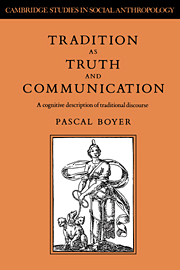Book contents
- Frontmatter
- Contents
- Preface
- Acknowledgements
- 1 Conserved world-views or salient memories?
- 2 How to think with ‘empty’ notions
- 3 Criteria of truth
- 4 Customised speech (I): truth without intentions
- 5 Customised speech (II): truth without meaning
- 6 Customised persons: initiation, competence and position
- 7 Conclusions and programme
- Notes
- Bibliography
- Index
- Cambridge Studies in Social Anthropology
4 - Customised speech (I): truth without intentions
Published online by Cambridge University Press: 27 August 2009
- Frontmatter
- Contents
- Preface
- Acknowledgements
- 1 Conserved world-views or salient memories?
- 2 How to think with ‘empty’ notions
- 3 Criteria of truth
- 4 Customised speech (I): truth without intentions
- 5 Customised speech (II): truth without meaning
- 6 Customised persons: initiation, competence and position
- 7 Conclusions and programme
- Notes
- Bibliography
- Index
- Cambridge Studies in Social Anthropology
Summary
In many or most cultures, divination is considered a reliable source of true statements about important events or states of affairs. In traditional contexts it constitutes a crucial ‘truth–making’ procedure. Anthropological theories, however, do not say much about the intellectual processes whereby divinatory statements are judged true. Although there is a number of precise, sometimes illuminating hypotheses about the social contexts of divination and ‘divination-driven’ decisions, the cognitive aspects of the phenomenon are relatively neglected. In this chapter I will try to put forward some hypotheses about the cognitive mechanisms which make divinatory procedures and the observation of omens a plausible source of truth.
Anthropological arguments: a school of red herrings
Before examining some general properties of divination procedures, let me first focus on some common anthropological ways of avoiding the question of veracity. They constitute a vague pre-theoretical picture of divination, which interferes with the anthropological description but cannot be taken as a serious theoretical attempt. The common picture usually implies some general claims about traditional statements, like the fact that divinatory truth is a function of authoritative positions, or that the statements made in divination are not supposed to be ‘true’, but simply ‘relevant’ or ‘meaningful’ (see chapter 3). While the idea of truth reduced to ‘meaningful’ statements is simply untenable given the ethnographic data, the ‘principle of authority’, taken as an explanation of truth criteria, just begs the question.
- Type
- Chapter
- Information
- Tradition as Truth and CommunicationA Cognitive Description of Traditional Discourse, pp. 61 - 78Publisher: Cambridge University PressPrint publication year: 1990



